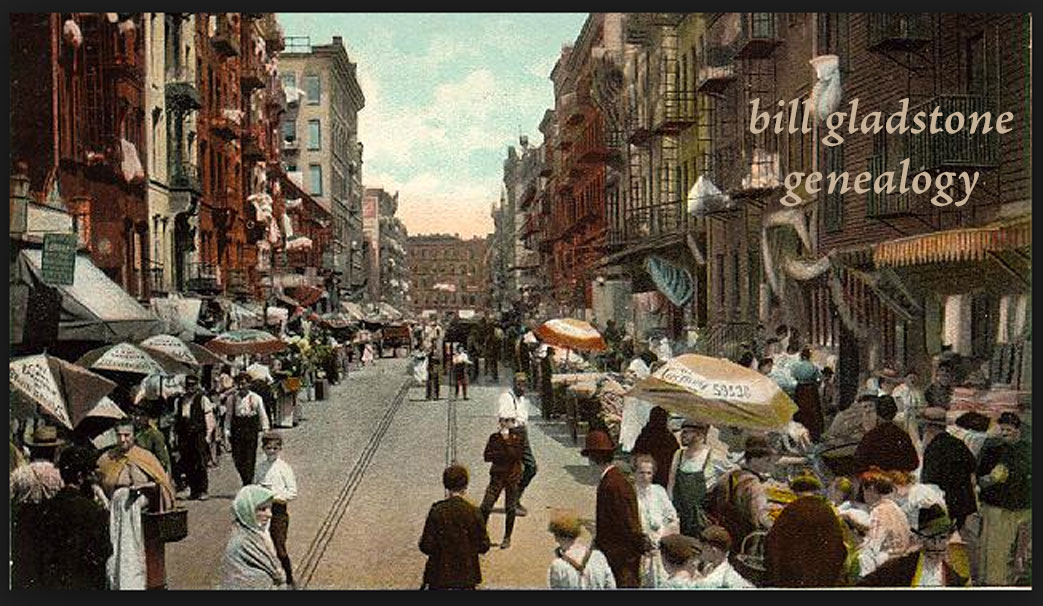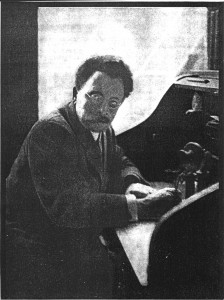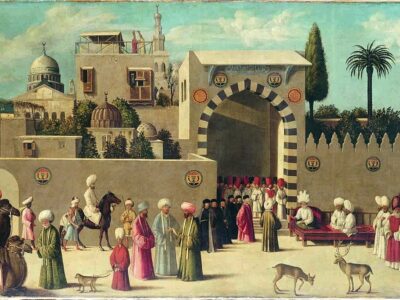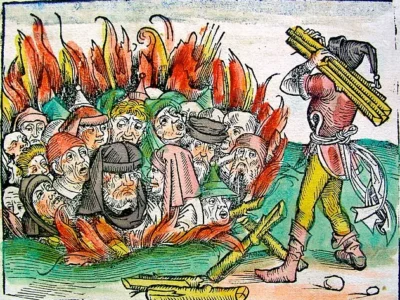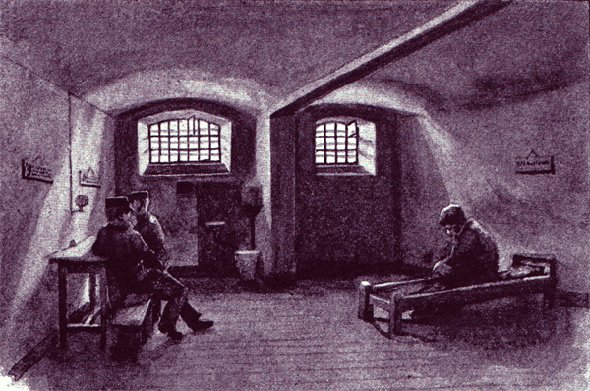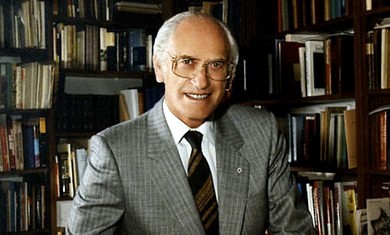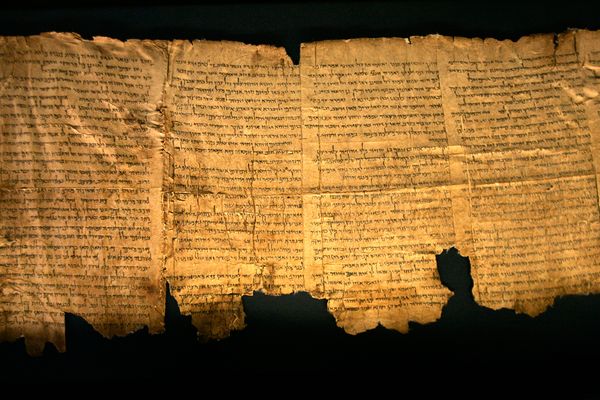These three little words, which appear in Abraham Cahan’s sparkling story The Imported Bridegroom (1898), may be among the most sublimely ironic utterances in all of modern Jewish literature.
The story opens with the unmarried Flora idly reading Little Dorrit as her wealthy father, Asriel Stroon, prepares to visit Pravly, his childhood shtetl. Once there, he pays an astronomic sum to secure the rabbi’s son Shaya as a bridegroom for his daughter; besides being an exceptional talmudic scholar, Shaya is a charming young man of marriageable age. “The nearer Asriel, with the prodigy in tow, came to New York, the deeper did Pravly sink into the golden mist of romance, and the more real did the great American city grow in his mind.”
At first Shaya and Flora are like oil and water, but once he acclimatizes to America and agrees to Flora’s wish that he secretly study medicine, the two are betrothed. Eventually Asriel hears troubling rumors about Shaya — he has become an “epikourus,” he smokes on Shabbos, he hasn’t attended synagogue in weeks — and begins to shadow him. Seeing Shaya disappear beyond the massive doors of an imposing edifice, Asriel is ready to believe the worst. “Dis a choych?” he asks a stranger in stunned disbelief, reflecting Cahan’s wonderful ear for street cadences.
“A church? No, it’s a library — the Astor Library,” the stranger replies: Shaya has plunged into the vast ocean of Gentile learning. America soon turns him into a proponent of Positivism and a passionate member of a weekly debating circle on Harriet Martineau’s Auguste Comte, a text he considers sublime. Not even Flora can command her darling fiance’s attentions any longer; Asriel, with bitter resignation, elopes to Palestine with his housekeeper. Such is how even the purest gold gets tarnished in America.
As evidenced in both his classic novel The Rise of David Levinsky (1917) and in his brilliant stewardship of the Daily Yiddish Forward which he edited for half a century (until his death in 1951), Cahan was always keen to depict the world as it was — not glittering with romance but tarnished by the gritty realism of daily life. Even in his early novel Yekl, which became the basis for the movie Hester Street, he wrote about what he saw around him, not what he wished could exist in a better world.
Many Jewish readers who had worked their way into middle- and upper-class American society were appalled by the baseness evident in some of his ghetto characterizations, as in Yekl. “If you want to describe the Jews to Americans, why not describe the best of us, instead of choosing this low, coarse, immoral tenement fellow?” one lady wrote to him. “My dear madam,” he replied, “I chose Yekl because he and his tenements seem to me more interesting than even the best Jews uptown.”
Cahan had helped found the Forward in 1897, then left for greener journalistic pastures. In his absence, the paper lapsed into a struggling socialist feuilleton, filled with long theoretical articles about socialism that preached and shouted at the few readers it managed to attract. Beseeched by the paper’s collective management, who offered him complete control to do as he saw fit, Cahan returned as editor in 1902.
His first edict was to order the staff to abandon their pompous German style and write in plain Yiddish. Next he jettisoned all abstract discussion of socialism; he replaced an essay on Karl Marx in his first issue with a lively piece on Jewish students at New York City College carrying a socialist message between the lines. Although labour’s struggle with the capitalist bosses remained a key focus, Cahan added more American news to the paper and presented it without the usual socialist slant. He also included cultural reviews, translated stories and articles that interpreted American institutions and life. Presented in the homely “mamaloshn” of the streets, the paper’s new dynamic mix aroused immediate excitement. With Cahan at the helm, readership eventually soared from 6,000 to more than 225,000.
As in his literary works, Cahan filled the Forward with colourful scenes of everyday life as it was, not as it should be, and vigourously defended his editorial stance when challenged. When a keenly-observed article on the compulsion of Jewish mothers to equip their children with pocket handkerchiefs provoked some of his comrades to ask what handkerchief had to do with Socialism, he replied, “Since when has Socialism been opposed to clean noses?”
Perhaps his most famous innovation was the Bintel Brief, a column devoted to the ordinary problems of the people; Cahan called it “the book of life.” One typical early letter came from an old orthodox mother, lamenting that her son refused to say kaddish for a recently deceased father. “I beg him; for weeks I cannot sleep. But still he refuses. He says he would be a hypocrite if he said kaddish, because he does not believe in God. What can I do?” In reply, the paper ordered the son to say kaddish at once. “(I)t will do your mother good, and so, when you go to the synagogue, you will not be a hypocrite, but only a kind son who is comforting a broken old mother.”
Like a latter-day Moses and Aaron wrapped up in one, Cahan played a key role in public issues, was a gifted orator, and sometimes faced the people’s wrath. In 1912 he urged the settlement of a strike and an angry mob broke some of the paper’s windows. Dauntless, he turned to address the crowd but suddenly collapsed; he was rushed to hospital and survived a serious operation.
Convalescing away from the daily grind of the pressroom, he began writing The Rise of David Levinsky, a work that had been on his mind for years. Written with his characteristic attention to everyday life, it is filled with fresh observations on the customs, thoughts, concerns and manners of Jewish Americans in the Gilded Age and early 20th century. No wonder it is recognized as a classic of Jewish immigrant fiction; no wonder Abraham Cahan has risen into the pantheon of Jewish literary greats. ♦
© 2005
